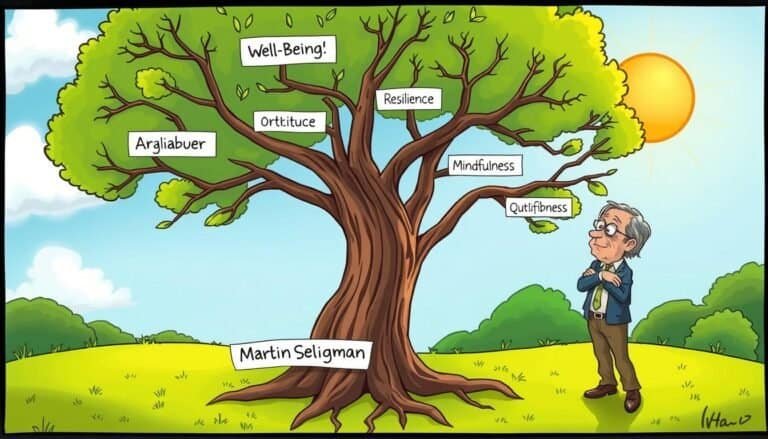Mindfulness and Mental Health Practices
In today’s fast-paced world, keeping our mental health in check is crucial. The government sees well-being as being in a good physical, social, and mental state. It means being able to handle life’s ups and downs, feeling good about ourselves, and connecting well with others.
It also means feeling a sense of purpose and being valued. Mindfulness is a key part of this. It’s about paying attention to the now through meditation, breathing, and yoga. This practice helps us notice our thoughts and feelings without getting lost in them.
Studies show that Mindfulness is great for our Mental Health and Well-being. It helps with stress, anxiety, depression, and addiction. By being more mindful, we can manage our emotions better.
Key Takeaways
- Mindfulness is a practice of being present and aware in the moment, which can improve mental health and well-being.
- Research has shown the benefits of mindfulness for managing stress, anxiety, depression, and addiction.
- Mindfulness can help individuals regulate their emotions, fostering qualities like calmness, patience, and empathy.
- Mindfulness-based interventions are often integrated into evidence-based mental health treatments.
- Practicing mindfulness can lead to positive changes in brain structure and function, supporting emotional resilience and self-awareness.
What is Mindfulness and Why is it Important?
Mindfulness is a practice that means paying attention to the now with an open mind. It helps us stay in the moment without judgment. This practice is great for our mental health and well-being.
Understanding Mindfulness
Mindfulness is all about being aware and accepting of our thoughts and feelings. We learn to watch our experiences with curiosity and kindness. This way, we don’t let stress, anxiety, or depression take over.
The Benefits of Mindfulness for Mental Health
Studies show that mindfulness is good for our mental health. It helps us handle stress and serious illness better. It also lowers anxiety and depression. Plus, it changes the brain areas linked to memory, learning, and feeling emotions.
For those fighting addiction, mindfulness helps with self-awareness and control. It’s also shown to lessen symptoms of mental health issues like anxiety and depression.
Mindfulness is easy to do and helps many people. Adding it to our daily life boosts our presence, self-awareness, and overall well-being.
Mindfulness Techniques for Stress Reduction
Mindfulness is a great way to handle stress. It offers tools like mindful breathing exercises and body scan meditation to help reduce stress.
Mindful Breathing Exercises
Mindful breathing means paying attention to how you breathe. It helps calm your mind and body. Start by taking deep breaths and notice how the air moves in and out.
You can count your breaths or imagine the air moving through your body. This can make you feel more relaxed.
Body Scan Meditation
Body scan meditation is about focusing on different body parts one by one. Start at your toes and move up, noticing any feelings or tension. This can help release physical stress and make you feel more relaxed.
Studies show that body scan meditation can really help with stress and anxiety.
Adding mindfulness techniques like mindful breathing and body scan meditation to your daily life can change how you handle stress. They help you stay in the moment and build calm and resilience.
Mindfulness and Mental Health Practices
Mindfulness is now a key part of many mental health treatments and stress relief programs. Mindfulness-Based Cognitive Therapy (MBCT) mixes mindfulness with Cognitive Behavioral Therapy to fight negative thought patterns in depression. Mindfulness-Based Stress Reduction (MBSR) focuses on long-term stress that harms mental and physical health. It’s a main part of therapies like Acceptance and Commitment Therapy (ACT) and Dialectical Behavioral Therapy (DBT).
Studies show mindfulness can greatly improve mental health. It can cut stress symptoms by up to 28%, depression by 40%, and anxiety by 25%. It can also reduce addiction symptoms by 50%. Plus, it can lower heart health risks by 30%.
Mindfulness isn’t just for mental health. Regular mindfulness meditation can boost emotional control and behavior by 20%. Adding mindfulness to daily life can increase awareness by 35%. Even simple mindful breathing can improve memory by 15%.
More and more, mindfulness is seen as a key tool for better mental health and well-being. It’s easy to learn and practice, through group classes, one-on-one sessions, online courses, books, or practicing at home.
Incorporating Mindfulness into Daily Life
In our fast-paced world, it’s easy to just go through the motions without thinking. In fact, 95% of our behavior runs on autopilot, leaving little room for intentional actions. But, by adding simple mindfulness practices to our daily routines, we can change that. We can move from automatic responses to more thoughtful living.
Mindful Walking
One easy way to bring mindfulness into your day is through mindful walking. Set aside 10-15 minutes each day to walk outside. Focus on the feelings in your feet and the muscles in your legs as you move. Breathe deeply and keep your attention on the now, not your thoughts. This simple act can calm your mind, improve focus, and help you feel more connected to your body.
Mindful Eating
Mindful eating is another powerful mindfulness practice. Instead of eating quickly while doing other things, take time to really enjoy each bite. Notice the textures, tastes, and smells of your food. Pay attention to when you’re hungry and when you’re full. This way, you’ll enjoy your meals more and have a healthier relationship with food.
Adding mindfulness to your daily life doesn’t have to be hard. Start with simple things like mindful walking and eating. Then, add more activities like meditation, yoga, or mindful talking. With regular practice, you can live a more balanced, thoughtful, and rewarding life.
The Science Behind Mindfulness and Brain Health
Recent studies have shown that mindfulness practices are great for brain health and thinking skills. They found that regular meditation changes the brain areas for memory, learning, and handling emotions.
Neurological Changes and Mindfulness
Studies using brain scans show that mindfulness changes the brain. It makes more gray matter in areas for learning, memory, and controlling emotions. These changes mean better thinking skills and brain health.
For instance, Harvard University researchers found that an eight-week mindfulness program increased gray matter in the hippocampus. This area is key for memory and learning. It also reduced gray matter in the amygdala, which deals with stress.
Another study in JAMA Psychiatry showed that mindfulness meditation changed the insula, a part of the brain for self-awareness and emotions. This means mindfulness can help with better self-control and emotional balance.
Research on mindfulness and the brain is growing. It shows mindfulness can help with thinking, feeling better, and keeping the brain healthy. Adding mindfulness to daily life can help improve mental abilities.
Mindfulness-Based Therapies for Mental Health
Mindfulness-based therapies are now key treatments for many mental health issues. They mix mindfulness with techniques from therapies like Cognitive Behavioral Therapy (CBT). This creates a full approach to better mental health.
Mindfulness-Based Cognitive Therapy (MBCT)
Mindfulness-Based Cognitive Therapy (MBCT) is a top choice for stopping depression from coming back. It blends mindfulness with CBT to help people notice their thoughts and feelings better. Studies show it cuts down the chance of depression coming back in people who have had it before.
Mindfulness-Based Stress Reduction (MBSR)
Mindfulness-Based Stress Reduction (MBSR) is a powerful therapy for dealing with stress’s long-term effects on health. It teaches being fully in the moment with activities like meditation and yoga. This has been proven to lessen anxiety, depression, and chronic pain.
Many studies highlight how mindfulness-based therapies help mental health. A big review of these therapies found they improve anxiety, depression, and overall happiness in different groups of people. They also make it easier to manage emotions, handle stress, and improve life quality.
The mental health field is always changing, and mindfulness-based methods are becoming more accepted. They help people understand their feelings better and find better ways to cope. By using mindfulness in therapy, doctors can help people gain a deeper insight into their lives.
Conclusion: Embracing Mindfulness for a Healthier Mind
Mindfulness is a great way to improve our mental health and well-being. It helps us notice our thoughts and feelings in the moment. This can help us handle stress, anxiety, and depression better.
Adding mindfulness to our daily life can boost our brain health. Techniques like mindful breathing and walking can make us more aware. They help us control our emotions and think better.
Therapies like Mindfulness-Based Cognitive Therapy (MBCT) and Mindfulness-Based Stress Reduction (MBSR) work well for mental health issues. Studies show mindfulness can be as good as antidepressants for depression. It can also cut down anxiety and depression by up to 30%.
By practicing mindfulness, we can have a healthier mind and a better life. It helps reduce stress and improves our physical and mental health. Mindfulness is a powerful way to live a more fulfilling life.
Source Links
- Mindfulness and emotional well-being: Strategies to try
- Mental Health and Mindfulness –
- Mindfulness Matters
- Mindfulness for Your Health
- 8 Mindfulness Exercises That Also Reduce Stress
- How to Manage Stress with Mindfulness and Meditation
- How to look after your mental health using mindfulness
- What to Know About Mindfulness and Mental Health
- 5 Simple Mindfulness Practices for Daily Life
- Can mindfulness exercises help me?
- Incorporating Mindfulness Practices into Daily Life – The Berman Center
- The Science of Mindfulness
- Harvard researchers study how mindfulness may change the brain in depressed patients
- The Science of Mindfulness
- Mindfulness-Based Interventions for Anxiety and Depression
- Mindfulness meditation: A research-proven way to reduce stress
- Mindfulness-Based Therapy – an overview
- Mindfulness and Behavior Change
- Benefits of Mindfulness – HelpGuide.org
- Mindfulness Definition | What Is Mindfulness







